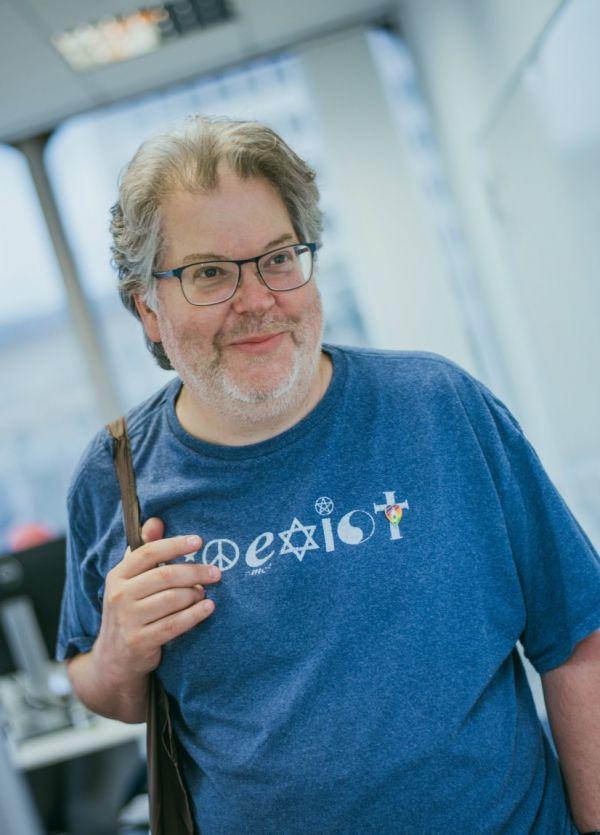Fighter for Start-ups Financing: My Whole World Has Gone Mad
Difficulties in accessing financing is holding back some of the world’s most promising entrepreneurs, but blockchain could provide the answer. That’s according to Cofound.it chairperson David Prais, who wants to shake up the way start-ups are funded.
Cryptonews.com spoke to the blockchain expert to find out more about himself and the company’s blockchain project.

When did you become interested in blockchain?
You could say it was when I took a computer science degree in the 1980s. That was all about computers replacing inefficient systems. Blockchain is not new but is simply an evolution – just as the internet was.
How has your life changed since entering the blockchain industry?
My whole world has gone mad – and I love it. This world is moving at hyper-speed and the goals and direction are all good. But we have a lot of young, bright, enthused, idealistic people working in the space, and we need to ensure the industry matures so fewer mistakes occur and trust grows.
What types of mistakes are happening?
There isn’t enough due diligence on ICOs. Coins are being released that shouldn’t be and there is a lot of hype around them rather than real facts. We’re seeing deception occurring and that could give the industry a bad name.
Our goal at Cofound.it is to put in place proper processes so that people who invest can rest assured that a number of very bright individuals feel the investment is a good idea.
The space will mature, I’m sure, but “think” and “safety first” have to be the watchwords.
What lessons have you learned?
Many: some great things about millennials; really good intentioned people on the whole. Whatever the UK, the US and even Europe does in terms of trying to create isolationist environments, we live in a global community and a global economy, and it is wonderful.
Governments will always try to control the people “for their own good”, but good people will overcome.
Are you investing in cryptocurrency?
I have a diversified portfolio that also includes cryptocurrency. I’m making money out of it, but it’s just a new way of living than trying to get rich quickly.
I’m getting a preview of the future, but as time progresses we will all be part of this global community, and those that are not will be the poorer for not participating. Not poorer in money, but poorer in life.
What led to the launch of Cofound.it?
I guess a couple of things: one was that the time was right, but, fundamentally, the financing of start-ups has gone wrong. I see this from my role as a director within the Funding London organisation.
Some people have tried to rebalance the powers of funders and start-ups, but we really need a proper shake-up to try to get the balance right moving forward.
Cofound.it is an attempt to correct the imbalance so it works for all parties.
How does blockchain help?
Let’s say I want to borrow money from a bank. I go to the bank and they have a whole load of rules, I have to fill in forms and my fate depends on one human making a decision. Bureaucracy and a single decision-maker gets in the way of the process working effectively.
With blockchain, businesses and individuals can feel certain that the right decisions and actions are being taken without bureaucracy getting in the way.
Let’s give the example of Cofound.it. Our goal is to help start-ups raise enough funding to give them an 18-month runway to develop their business. This compares with the typical six-month runway that venture capital funding enables.
By seeking greater investment, and by crowdsourcing the assessment of companies, we get the best experts evaluating the best start-ups. And that attracts the best money. You end up in this lovely virtuous circle which increases the start-up’s chances of success.
By putting that through an ICO process, we’re democratising the investment so that everyday people can participate as well. It’s not just the world’s 1% who are involved.
Where else does blockchain offer opportunities?
In the long term the opportunities are massive. For individuals, blockchain means they can trust transactions and feel certain the right things are being done. They don’t have to rely on one human bureaucrat making decisions over their life.
I’ve seen the negative impact that bureaucracy has when friends of mine have gone through the immigration process. They’re required to fill in numerous complex forms. If they make an error and get rejected, they have to spend thousands of pounds on an appeal. On top of this, some officials may have cultural bias towards certain applicants – they’re not always acting in a neutral way.
When you put this on the blockchain it makes it significantly more efficient, removes any cultural bias and allows for far more honest and predictable responses.
What are the obstacles to the wider use of blockchain?
When you’re replacing a bureaucracy, the first thing you can expect is for it to fight back. That is what we’re seeing playing out at the moment.
At the end of the day, bureaucrats don’t want to lose their jobs. There are systems in place that work for the people currently in charge, and they don’t necessarily want changes to happen.
You can call their systems corrupt. Certainly, a sense of that corruption became visible in 2008 with the banking crash. I believe that’s one of the reasons why the financial sector is the initial focus for blockchain, but I think we’ll start seeing all sorts of other industries being affected as well.




